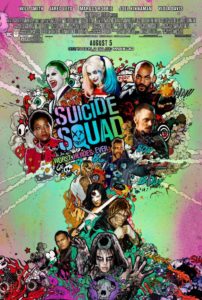 As an avid DC fan and someone who is thoroughly supportive of the company’s efforts to establish a tone that is distinct from its biggest competitor, Marvel, Suicide Squad strikes me nonetheless as a curious choice for the third film in the DCEU. Man of Steel (2013), the studio’s first entry into the new cinematic universe, makes complete sense: You want to kick things off with one of the world’s most iconic, beloved, and popular superheroes. With Batman added to the equation, this year’s highly-anticipated Batman v Superman: Dawn of Justice (2016) was certainly poised to be the cash cow that Warner Brothers needed to bring the fight to Marvel’s doorstep. (Of course, we all know what happened there.) But Suicide Squad, which features a cadre of DC’s most maniacal villains and only one or two characters (the Joker and Harley Quinn) with which casual viewers and non-comic book fans are likely familiar, only makes sense—financially, at least—if the movie is incredibly well received and boasts an incredibly moving, enthralling, and affecting narrative that will get people to the theater en masse. So after an opening weekend that broke August box office records and fueled fiery debates between critics and fans, the question is: Will Suicide Squad have the momentum it needs to get people back to the theater and draw new viewers in, or will its popularity, like that of BvS, wane (pun intended) in coming weeks?
As an avid DC fan and someone who is thoroughly supportive of the company’s efforts to establish a tone that is distinct from its biggest competitor, Marvel, Suicide Squad strikes me nonetheless as a curious choice for the third film in the DCEU. Man of Steel (2013), the studio’s first entry into the new cinematic universe, makes complete sense: You want to kick things off with one of the world’s most iconic, beloved, and popular superheroes. With Batman added to the equation, this year’s highly-anticipated Batman v Superman: Dawn of Justice (2016) was certainly poised to be the cash cow that Warner Brothers needed to bring the fight to Marvel’s doorstep. (Of course, we all know what happened there.) But Suicide Squad, which features a cadre of DC’s most maniacal villains and only one or two characters (the Joker and Harley Quinn) with which casual viewers and non-comic book fans are likely familiar, only makes sense—financially, at least—if the movie is incredibly well received and boasts an incredibly moving, enthralling, and affecting narrative that will get people to the theater en masse. So after an opening weekend that broke August box office records and fueled fiery debates between critics and fans, the question is: Will Suicide Squad have the momentum it needs to get people back to the theater and draw new viewers in, or will its popularity, like that of BvS, wane (pun intended) in coming weeks?
On one hand, it seems like David Ayer’s Suicide Squad could indeed be poised for long-term financial success. It doesn’t have any major competition for the next few weeks (although early buzz surrounding Pete’s Dragon makes it seem like Disney could be a contender); and Suicide Squad is the only comic book movie audiences have until Scott Derrickson’s Dr. Strange hits cinemas in November, which, given the market’s heavy saturation with superhero films, is basically an eternity. Maybe we’re so hungry for comic book films that we’ll simply eat whatever is put in front of us. At the same time, however, the film’s overwhelmingly negative critical reception and especially its impending ban in China could spell trouble for Warner Brothers.
Financial success or not, what is most troubling to me (again, as a DC fan) is that many of the criticisms leveled against this film are absolutely and 100%  spot-on. Even if you loved Suicide Squad, found it touching, funny, and refreshing (which is certainly your prerogative and right as a moviegoer), it’s important to recognize that it is still a mess of a film; among other things it’s a heap of plot holes and an editor’s worst nightmare. And while I don’t harbor the kind of pure, unadulterated, and all-encompassing hatred for Suicide Squad that so many do (part of this can, once again, be attributed to my predilection for DC), I do absolutely long for a film in the DCEU that I can enjoy on both a personal, emotional level as well as a formal and technical level. I want a film that doesn’t leave me scratching or shaking my head even if I am ultimately able to enjoy it. (Side note: Snyder’s Man of Steel works well for me on all of these levels, but that’s another conversation.) Sure, Suicide Squad boasts some hilarious banter and truly impressive and powerful performances from Margot Robbie (Harley Quinn), Viola Davis (Amanda Waller), and Will Smith (Deadshot), but it ultimately misses the mark for me. Hopefully Patty Jenkins comes to the rescue next year with Wonder Woman.
spot-on. Even if you loved Suicide Squad, found it touching, funny, and refreshing (which is certainly your prerogative and right as a moviegoer), it’s important to recognize that it is still a mess of a film; among other things it’s a heap of plot holes and an editor’s worst nightmare. And while I don’t harbor the kind of pure, unadulterated, and all-encompassing hatred for Suicide Squad that so many do (part of this can, once again, be attributed to my predilection for DC), I do absolutely long for a film in the DCEU that I can enjoy on both a personal, emotional level as well as a formal and technical level. I want a film that doesn’t leave me scratching or shaking my head even if I am ultimately able to enjoy it. (Side note: Snyder’s Man of Steel works well for me on all of these levels, but that’s another conversation.) Sure, Suicide Squad boasts some hilarious banter and truly impressive and powerful performances from Margot Robbie (Harley Quinn), Viola Davis (Amanda Waller), and Will Smith (Deadshot), but it ultimately misses the mark for me. Hopefully Patty Jenkins comes to the rescue next year with Wonder Woman.
When the smoke clears and the jokes stop, it is apparent that there’s an odd sort of irony deeply embedded in the core of Suicide Squad. In the film’s climax (spoilers ahead) the group comes face to face with the antagonist, discovering that she is able to invade their minds and project for them a fantasy world in which their deepest longings are granted. Deadshot is reunited with his daughter, and Harley is married to a very domestic-looking Joker. The sum of these fantasies strikes at the heart of the human condition, revealing that our ultimate desire—hero or villain, friend or foe—is to be loved and accepted fully and completely. It’s a wish Enchantress can’t grant, and a dilemma out of which these villains can’t climb. Redemption, Suicide Squad suggests, does not come from within. In this sense it’s not far from the Kingdom of God, where salvation comes from without, from the eternal, from the Word made flesh. Of course, the ultimate irony is that Ayer’s film desperately needs to be loved and accepted by its fans if it is going to have any chance of saving Warner Brothers from financial woes.

